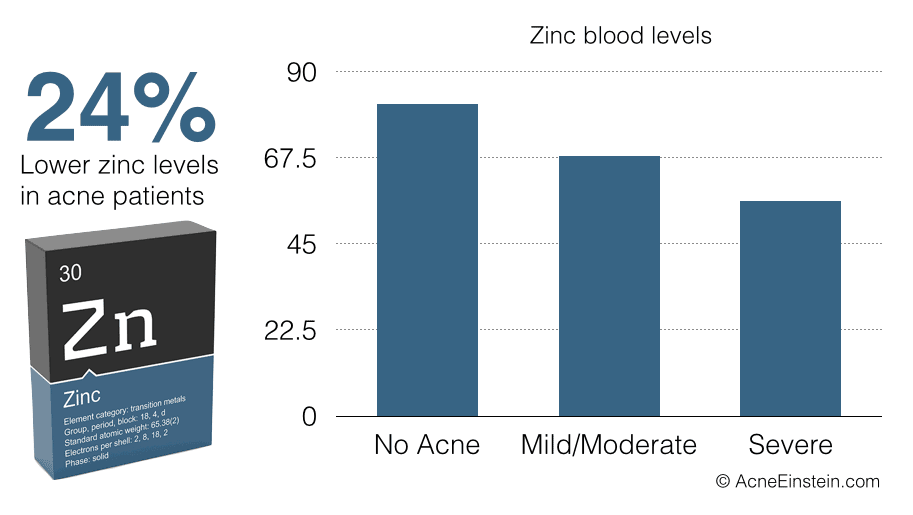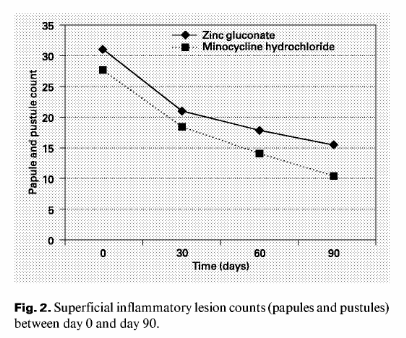To date, zinc is the only nutritional supplement seriously studied as a treatment for acne. Most of the studies were done in the late seventies, and while they showed zinc was effective, it was deemed not to be effective enough. Antibiotics showed more promise and that’s why doctors started prescribing them instead of zinc.
That doesn’t mean zinc wouldn’t work, as we are about to find out.
Acne patients are low in zinc
In 2013, Turkish researchers compared blood levels of zinc, vitamin E, and vitamin A between acne patients and their peers without acne. This image shows the results divided by acne severity.

Source: Ozuguz, P. et al. Evaluation of serum vitamins A and E and zinc levels according to the severity of acne vulgaris.Cutan Ocul Toxicol (2013). https://www.ncbi.nlm.nih.gov/pubmed/23826827
As you can see, zinc levels are lower in acne patients and go down as acne severity goes up. Same thing with vitamin E levels. In the case of vitamin A, acne patients had lower levels than those with clear skin, but there was no relationship between acne severity and vitamin A levels.
In 2014, Iranian researchers did a similar study. They also showed an inverse correlation between zinc levels and acne severity. Though in their study, the results weren’t as dramatic, and there was no difference between people with clear skin and those with mild acne.
Among other things, zinc plays a role in the antioxidant system. These results probably reflect the fact that acne patients are under higher oxidative stress. Studies looking at other antioxidants and signs of inflammation also show that acne patients are low in antioxidants.
Studies on zinc supplementation for acne
To date, 14 studies have looked at the effect of zinc supplementation on acne. Most were published in the late seventies and eighties. I won’t go through them individually, but most show zinc supplementation reduced acne anywhere from 30 to 58%. Some studies showed that zinc was as effective as the antibiotics used at that time.
The best study was published in 2001 by a group of French researchers. In the study, 332 patients were given either 30mg of zinc or 100mg of minocycline (an oral antibiotic). This graph shows the inflammatory pimple counts for both groups.

Source: Dreno, B. et al. Multicenter randomized comparative double-blind controlled clinical trial of the safety and efficacy of zinc gluconate versus minocycline hydrochloride in the treatment of inflammatory acne vulgaris. Dermatology (Basel) 203, 135–40 (2001). https://www.ncbi.nlm.nih.gov/pubmed/11586012
In case it’s hard to read, the darker, solid line shows the results for the zinc group. Sure, the minocycline group got somewhat better results, but it’s equally true that there was a significant drop in the number of inflammatory pimples in the zinc group.
As to non-inflammatory pimples (blackheads and whiteheads), their numbers dropped by 21% and 34% in the zinc and minocycline groups, respectively. So there minocycline had a clear advantage over zinc.
From this study, it seems that zinc supplementation works well for inflammatory pimples but isn’t that effective for blackheads and whiteheads.
Dosage and type of zinc
Zinc comes in many forms, zinc gluconate being the most common, which is the one they used in the above study. In 2010, Indian researchers published a paper where they speculated that the zinc forms with better bioavailability would be more effective than zinc gluconate. Scientifically their paper is pretty thin gruel, and I’m skeptical of their conclusions. That being said, there seems little harm in using the zinc forms with better bioavailability. The forms with the best bioavailability are zinc picolinate and zinc methionine.
Here are a few options to consider:
- Now Foods, L-OptiZinc: zinc methionine, 100 servings (30mg), $5.73.
- Solgar, Zinc Picolinate: zinc picolinate, 100 servings (22mg), $8.16.
- Country Life, Gluten Free, Zinc Picolinate: zinc picolinate, 100 servings (25mg), $7.19.
Please don’t ask me what’s the best zinc supplement. I really have no way to answer that.
As to dosage, most studies have used doses ranging from 30mg to 50mg / day. My suggestion would be to take 30mg/day to minimize the risk of side effects. The tolerable upper limit (the limit that shouldn’t cause side effects) is 40mg for adults.
Side effects
Zinc can cause gastrointestinal side effects for some people; common side effects include nausea, vomiting, and diarrhea. In the above zinc vs. minocycline study, 34% of the participants got some gastrointestinal side effects from zinc. But only 5 (3%) of them dropped out of the study, so we can assume the side effects weren’t too bad. Unfortunately, the paper didn’t mention whether the side effects subsided over time.
It’s well-known that zinc can cause gastrointestinal problems, so these findings are in no way unique. Some people say that taking zinc with meals reduces the gastrointestinal side effects.
At doses of 60mg and above (this dose also includes the zinc you get from foods), zinc can inhibit copper absorption and lead to deficiencies.
